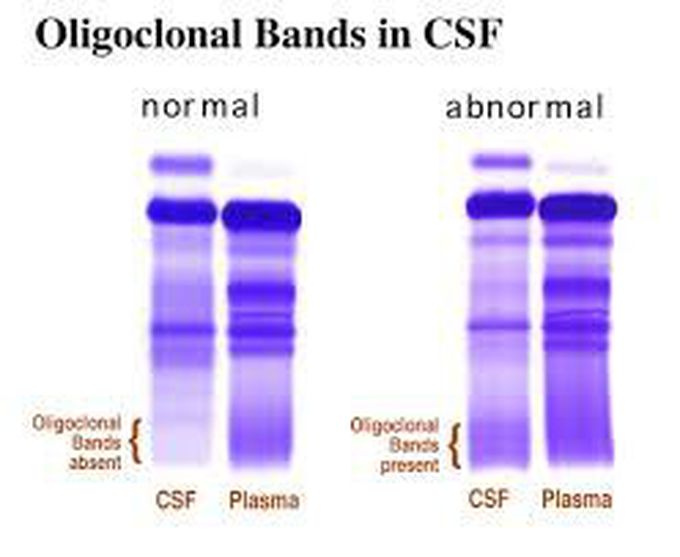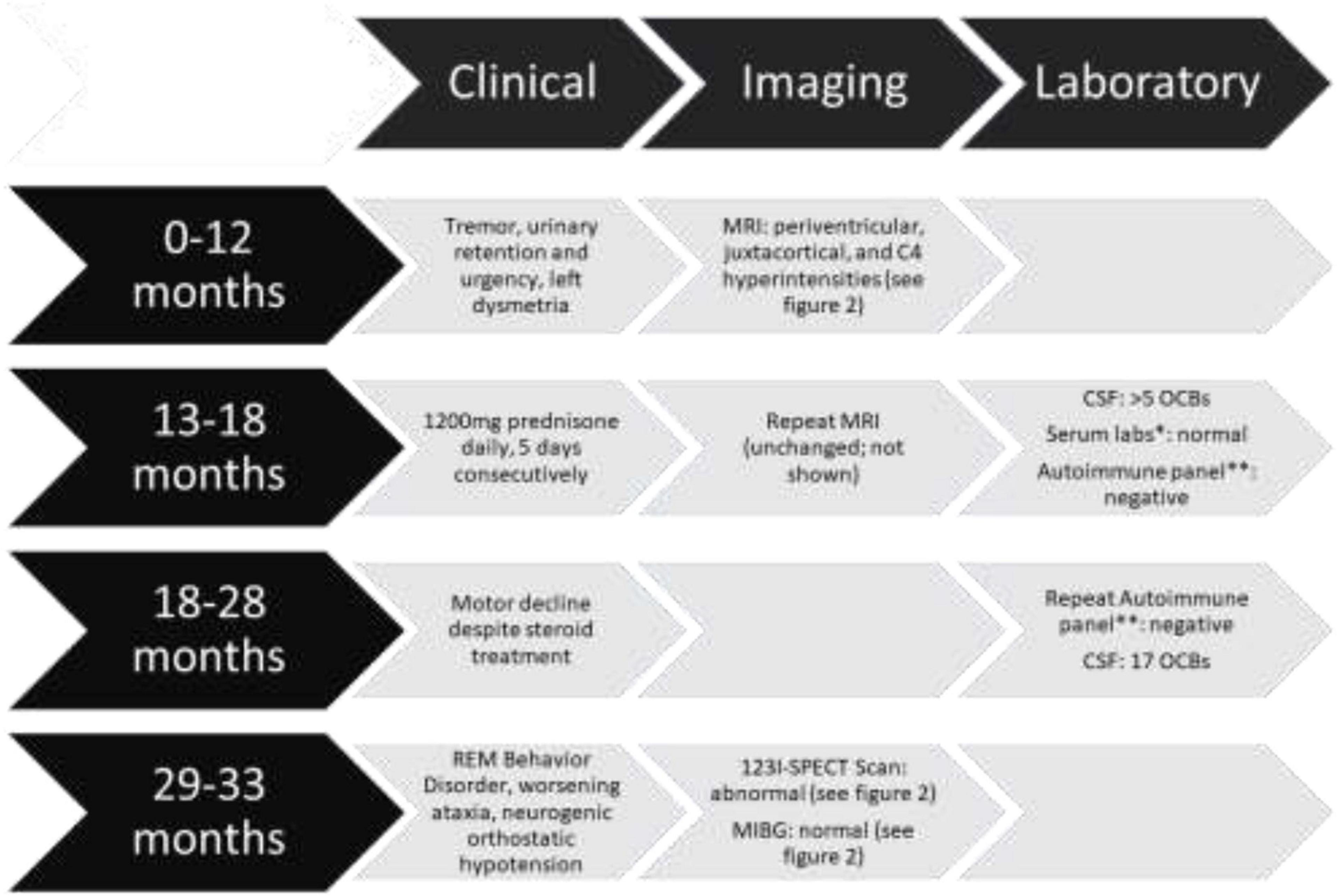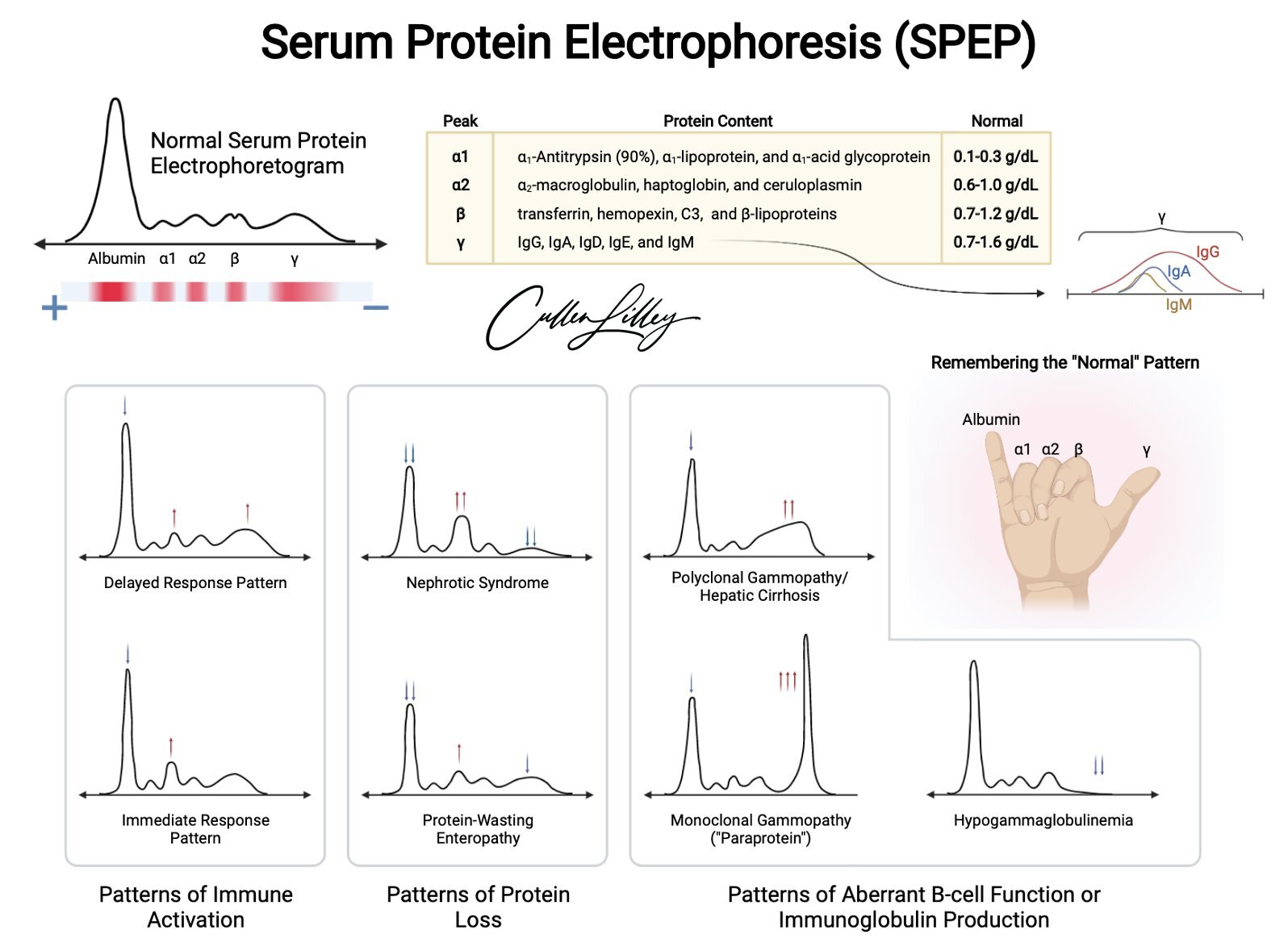What Conditions Show Oligoclonal Bands In Serum - When the oligoclonal band assay detects 2 or more unique igg bands in the cerebrospinal fluid (csf), the result is positive. Abnormal results are indicated by the presence of two or more oligoclonal bands in the csf that are not present in the serum. These bands in the csf pattern are. Oligoclonal immunoglobulin g (igg) bands (ocbs) are a useful diagnostic tool to detect a central humoral response. One means by which a diagnosis of autoimmune central nervous system disease is supported is via identification of unique oligoclonal bands in. Oligoclonal bands in csf not seen in serum but some common oliogoclonal bands. Five patterns are typically recognised: Csf is used in the. Oligoclonal bands are multiple distinct bands in the γ zone of the csf pattern that are not present in serum.
Oligoclonal bands in csf not seen in serum but some common oliogoclonal bands. Five patterns are typically recognised: Oligoclonal bands are multiple distinct bands in the γ zone of the csf pattern that are not present in serum. One means by which a diagnosis of autoimmune central nervous system disease is supported is via identification of unique oligoclonal bands in. Csf is used in the. Abnormal results are indicated by the presence of two or more oligoclonal bands in the csf that are not present in the serum. Oligoclonal immunoglobulin g (igg) bands (ocbs) are a useful diagnostic tool to detect a central humoral response. When the oligoclonal band assay detects 2 or more unique igg bands in the cerebrospinal fluid (csf), the result is positive. These bands in the csf pattern are.
Oligoclonal immunoglobulin g (igg) bands (ocbs) are a useful diagnostic tool to detect a central humoral response. Oligoclonal bands are multiple distinct bands in the γ zone of the csf pattern that are not present in serum. When the oligoclonal band assay detects 2 or more unique igg bands in the cerebrospinal fluid (csf), the result is positive. Abnormal results are indicated by the presence of two or more oligoclonal bands in the csf that are not present in the serum. Csf is used in the. One means by which a diagnosis of autoimmune central nervous system disease is supported is via identification of unique oligoclonal bands in. Oligoclonal bands in csf not seen in serum but some common oliogoclonal bands. Five patterns are typically recognised: These bands in the csf pattern are.
Oligoclonal bands in multiple sclerosis What does it mean?
Csf is used in the. Abnormal results are indicated by the presence of two or more oligoclonal bands in the csf that are not present in the serum. One means by which a diagnosis of autoimmune central nervous system disease is supported is via identification of unique oligoclonal bands in. Oligoclonal bands are multiple distinct bands in the γ zone.
Oligoclonal bands (electrophoresis) MEDizzy
Five patterns are typically recognised: Oligoclonal bands in csf not seen in serum but some common oliogoclonal bands. Csf is used in the. These bands in the csf pattern are. Oligoclonal bands are multiple distinct bands in the γ zone of the csf pattern that are not present in serum.
Oligoclonal Banding Assay; Diagnosing Multiple Sclerosis YouTube
Csf is used in the. These bands in the csf pattern are. Oligoclonal bands are multiple distinct bands in the γ zone of the csf pattern that are not present in serum. Oligoclonal immunoglobulin g (igg) bands (ocbs) are a useful diagnostic tool to detect a central humoral response. Five patterns are typically recognised:
OLIGOCLONAL Chughtai Lab
Csf is used in the. Oligoclonal immunoglobulin g (igg) bands (ocbs) are a useful diagnostic tool to detect a central humoral response. Oligoclonal bands in csf not seen in serum but some common oliogoclonal bands. Five patterns are typically recognised: Oligoclonal bands are multiple distinct bands in the γ zone of the csf pattern that are not present in serum.
Frontiers Oligoclonal Bands in Multiple System Atrophy Case Report
Oligoclonal bands are multiple distinct bands in the γ zone of the csf pattern that are not present in serum. Abnormal results are indicated by the presence of two or more oligoclonal bands in the csf that are not present in the serum. When the oligoclonal band assay detects 2 or more unique igg bands in the cerebrospinal fluid (csf),.
Evaluation of CSF kappa free light chains for the diagnosis of multiple
One means by which a diagnosis of autoimmune central nervous system disease is supported is via identification of unique oligoclonal bands in. Five patterns are typically recognised: When the oligoclonal band assay detects 2 or more unique igg bands in the cerebrospinal fluid (csf), the result is positive. Abnormal results are indicated by the presence of two or more oligoclonal.
Electrophoresis Multiple Myeloma
One means by which a diagnosis of autoimmune central nervous system disease is supported is via identification of unique oligoclonal bands in. These bands in the csf pattern are. Oligoclonal bands are multiple distinct bands in the γ zone of the csf pattern that are not present in serum. Abnormal results are indicated by the presence of two or more.
Pin on MS
Oligoclonal bands in csf not seen in serum but some common oliogoclonal bands. Five patterns are typically recognised: When the oligoclonal band assay detects 2 or more unique igg bands in the cerebrospinal fluid (csf), the result is positive. Abnormal results are indicated by the presence of two or more oligoclonal bands in the csf that are not present in.
PCR Analysis of the Immunoglobulin Heavy Chain Gene in Polyclonal
One means by which a diagnosis of autoimmune central nervous system disease is supported is via identification of unique oligoclonal bands in. Csf is used in the. Oligoclonal immunoglobulin g (igg) bands (ocbs) are a useful diagnostic tool to detect a central humoral response. Abnormal results are indicated by the presence of two or more oligoclonal bands in the csf.
CSF & SERUM PROTEIN ELECTROPHORESIS / OLIGOCLONAL BANDS Krown
When the oligoclonal band assay detects 2 or more unique igg bands in the cerebrospinal fluid (csf), the result is positive. Csf is used in the. Oligoclonal immunoglobulin g (igg) bands (ocbs) are a useful diagnostic tool to detect a central humoral response. Oligoclonal bands in csf not seen in serum but some common oliogoclonal bands. Five patterns are typically.
Csf Is Used In The.
These bands in the csf pattern are. Oligoclonal bands are multiple distinct bands in the γ zone of the csf pattern that are not present in serum. Oligoclonal immunoglobulin g (igg) bands (ocbs) are a useful diagnostic tool to detect a central humoral response. Oligoclonal bands in csf not seen in serum but some common oliogoclonal bands.
When The Oligoclonal Band Assay Detects 2 Or More Unique Igg Bands In The Cerebrospinal Fluid (Csf), The Result Is Positive.
Abnormal results are indicated by the presence of two or more oligoclonal bands in the csf that are not present in the serum. One means by which a diagnosis of autoimmune central nervous system disease is supported is via identification of unique oligoclonal bands in. Five patterns are typically recognised:









